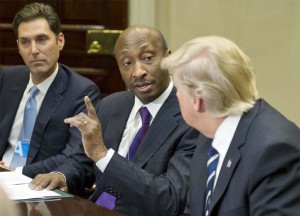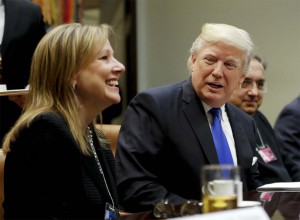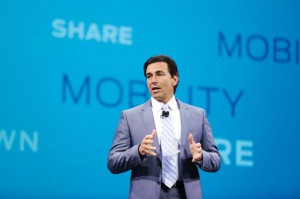
Merck CEO Kenneth Frazier with Pres. Trump before he resigned from the council and found himself rebuked in a presidential tweet.
(This story has been updated to include comments from GM CEO Mary Barra on the closing of the economic councils and the controversy over Charlottesville.)
Turning again to Twitter, President Donald Trump announced Wednesday that he is disbanding two economic advisory groups formed as he entered the White House last January and originally consisting of some of the nation’s top business leaders.
The move came shortly after the well-publicized resignation of an eighth council member, 3M CEO Inge Thulin. While some of the business leaders had resigned earlier in the year, the exodus had ramped up in recent days following a series of controversial remarks the president made regarding the weekend violence in Charlottesville, Virginia as neo-Nazis, KKK members and other White Supremacists marched through the city.
Other members of the council faced increasing pressure to resign, as well, including Mary Barra, the CEO of General Motors. But several industry insiders said Barra, in particular, faced a perplexing situation. The Trump Administration is considering several measures – including a possible rollback of mileage standards, and the renegotiation of the North American Free Trade Agreement – that could have substantial impact on GM. As part of the two councils, Barra had unusually good access to the president.
(Automakers wary of president’s plans for new NAFTA treaty. Click Here to learn why.)
“Rather than putting pressure on the businesspeople of the Manufacturing Council & Strategy & Policy Forum, I am ending both. Thank you all!” Trump tweeted shortly after 1:15 Wednesday afternoon.
The president’s tweet followed the announcements Wednesday that the leaders of Minnesota-based 3M and Campbell Soup had quit his manufacturing council, while a second strategic and advisory group was on the verge of collapse, Politico reported.
Several members resigned earlier in the year. Former Uber CEO Travis Kalanick was pressured to pull out after Trump announced his Muslim immigration ban. Tesla CEO Elon Musk resigned to protest the pull-out of the U.S. from the Paris Accords on global warming. But things intensified this week.
(Musk quits Trump as Trump quits Paris. Click Here for the story.)
Eight CEOs have resigned since Trump failed to denounce right-wing extremists in the aftermath of violent weekend in Charlottesville, Va. and instead issue a series of controversial comments on race and white supremacy that appeared to equate neo-Nazis and Klan members with counter-demonstrators.
Trump also came under criticism when he decided to lash out at Merck CEO Kenneth Frazier’s decision to resign on Monday. “he will have more time to LOWER RIPOFF DRUG PRICES!” Trump tweeted. Frazier said he had to “take a stand against intolerance.”’
The president’s attack on Frazier reportedly made some other members of the two councils even more uncomfortable. But the doors flew open when, on Tuesday afternoon, Trump had his third opportunity to discuss publicly the violence that hit Charlottesville and again blamed “all sides,” while backing away from comments specifically calling out white supremacist groups he made the day before.
With even senior leaders of the GOP calling the president out, GE Chairman Jeff Immelt reversed an earlier decision to stay on the council, as did J&J Chief Executive Alex Gorsky who said, in a statement, “The President’s most recent statements equating those who are motivated by race-based hate with those who stand up against hatred is unacceptable and has changed our decision to participate in the White House Manufacturing Advisory Council.”
“Racism and murder are unequivocally reprehensible and are not morally equivalent to anything else that happened in Charlottesville,” said Denise Morrison, the head of Campbell Soup, as she also tendered her resignation.
Still other members of the two councils were reportedly coming under strong pressure, including GM CEO Barra, though the company declined to comment as late as Wednesday morning on her plans. But the topic caught fire on social media, many users calling on her to resign. Staying aboard would mean GM “is on the wrong footing,” suggested one Facebook user.
Barra was one of two Detroit auto executives to join the councils when they were formed seven months ago. Mark Fields left when he was ousted as Ford CEO in May.
(Manufacturers group blasts Trump on trade policies. For the story, Click Here.)
There is little doubt Barra hoped to use her closeness to the president to try to steer White House policies on a number of key issues. For one thing, the EPA has reopened the mid-term review of the Corporate Average Fuel Economy mandates passed during the Obama Administration and could sharply scale them back. And negotiators are getting ready to open NAFTA back up. That could seriously impact the network of factories GM and other manufacturers operate in the U.S., Canada and Mexico, many analysts warning that vehicle prices could rise, impacting sales and U.S. jobs.
The councils seemed to fit both the style and the promises of the new president. “Trump reveled in photo ops with the nation’s top executives, and has promised major advances in the country’s economic output, manufacturing and infrastructure,” noted the Hill, a moderate to conservative political website.
“Trump’s decision to disband the councils is a surprising retreat for the combative president, who has touted his business acumen, negotiating skills and economic policy as central strengths,” the Hill observed.
For his part, 3M chief executive Thulin appeared to sum up what many members were saying, whether publicly or privately, about being directly linked to a White House embroiled in such controversy. He said he joined the group “to advocate for policies that align with our values and encourage even stronger investment and job growth” — but “I believe the initiative is no longer an effective vehicle” to achieve those goals.
For her part, GM CEO Barra offered a comment shortly after the White House announcement, but it left open the question of whether she would have stayed had the councils not been disbanded.
“The President and members of the President’s Strategic and Policy Forum have disbanded the forum. General Motors is about unity and inclusion and so am I,” Barra said. “Recent events, particularly those in Charlottesville, Virginia, and its aftermath, require that we come together as a country and reinforce values and ideals that unite us – tolerance, inclusion and diversity – and speak against those which divide us – racism, bigotry and any politics based on ethnicity,” she said, adding she was very proud of GM’s work in support of American manufacturing.
(Paul A. Eisenstein contributed to this report.)


